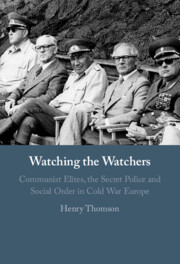Book contents
- Frontmatter
- Dedication
- Contents
- Figures
- Tables
- Acknowledgments
- Part I Introduction and Theory
- Part II Comparative Historical Analysis: Polish People’s Republic and the German Democratic Republic
- Part III Cross-national Quantitative Analysis
- 6 Introduction to Part III
- 7 Post-Stalinist Transitions, Elite Cohesion, and Coercive Agent Tenure
- 8 Chekists and Secret Informants: Post-Stalinist Transitions, Elite Cohesion, and Coercive Capacity
- Part IV Conclusion
- Appendix A Secret Police Agencies and Chiefs in Socialist Central and Eastern Europe, 1945–1989
- Appendix B Survival Analysis, Chapter 7
- Appendix C Agency Size Analysis, Chapter 8
- Bibliography
- Index
8 - Chekists and Secret Informants: Post-Stalinist Transitions, Elite Cohesion, and Coercive Capacity
from Part III - Cross-national Quantitative Analysis
Published online by Cambridge University Press: 22 February 2024
- Frontmatter
- Dedication
- Contents
- Figures
- Tables
- Acknowledgments
- Part I Introduction and Theory
- Part II Comparative Historical Analysis: Polish People’s Republic and the German Democratic Republic
- Part III Cross-national Quantitative Analysis
- 6 Introduction to Part III
- 7 Post-Stalinist Transitions, Elite Cohesion, and Coercive Agent Tenure
- 8 Chekists and Secret Informants: Post-Stalinist Transitions, Elite Cohesion, and Coercive Capacity
- Part IV Conclusion
- Appendix A Secret Police Agencies and Chiefs in Socialist Central and Eastern Europe, 1945–1989
- Appendix B Survival Analysis, Chapter 7
- Appendix C Agency Size Analysis, Chapter 8
- Bibliography
- Index
Summary
In this chapter, I test the effects of post-Stalinist transitions on two important measures of agency capacity: officers employed and individuals registered as secret informants by coercive agencies. I present an original cross-national dataset on officer and informant numbers for every coercive agency in communist Central and Eastern Europe from 1945 to 1989. I show that countries that experienced post-Stalinist transitions had similarly sized coercive agencies to other states before 1953, but these agencies shrank thereafter while others continued to grow. I then estimate a series of difference-in-difference models to test the effect of post-Stalinist transitions on agency size. I find that agencies under post-Stalinist regimes had significantly smaller coercive agencies after Stalin’s death. This confirms the theoretical logic laid out in Chapter 2 in a broader setting than the comparative historical analyses of Poland and East Germany in Chapters 4 and 5. Although the number of cases and coverage of data here are limited, my results suggest that the logic of elite cohesion and coercive capacity laid out in Chapter 2 is applicable to a wide range of authoritarian regimes.
Keywords
- Type
- Chapter
- Information
- Watching the WatchersCommunist Elites, the Secret Police and Social Order in Cold War Europe, pp. 223 - 252Publisher: Cambridge University PressPrint publication year: 2024



